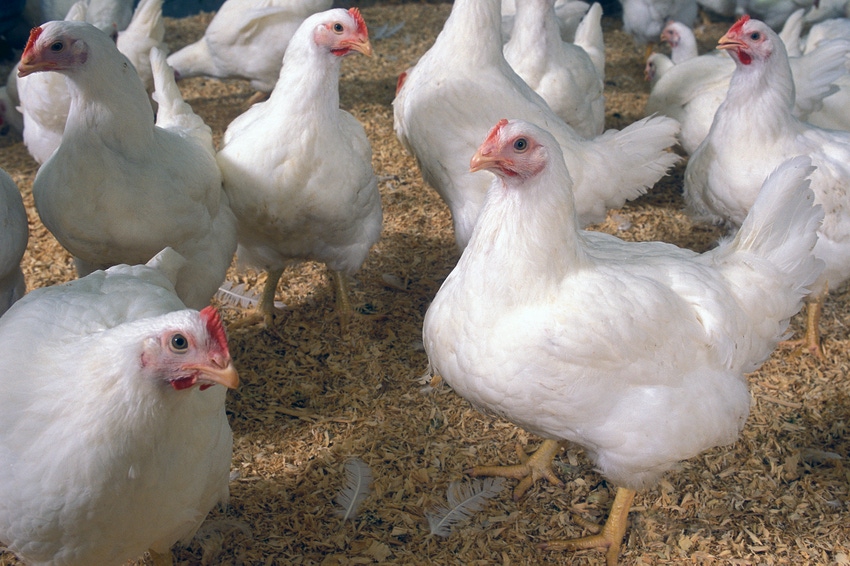March 6, 2017

USDA confirmed March 5 that a highly pathogenic avian influenza has sickened a commercial chicken breeder flock in Lincoln County, Tenn., which borders Alabama. It’s the first confirmed case of HPAI in U.S. commercial poultry this year.
HPAI is deadly for domesticated chickens and turkeys. On March 3, a commercial chicken facility in Lincoln County reported a high increase in chicken mortality to Tennessee’s veterinarian office at the Tennessee Department of Agriculture. H7 HPAI was confirmed from samples taken from the flock.
“Animal health is our top priority. With this HPAI detection, we are moving quickly and aggressively to prevent the virus from spreading,” said Tennessee veterinarian Dr. Charles Hatcher in a prepared statement.
The Tennessee chicken farm is under quarantine, along with approximately 30 other poultry farms within a 6-mile radius of it. The affected flock is being depopulated to stop potential spread of illness, and officials are testing and monitoring other flocks within the quarantined area. No other farm has reported an increase in chicken mortality.
“Many Tennessee families rely on the poultry industry for their livelihoods, and the state is working closely with local, county and federal partners and the poultry industry to control the situation and protect the flocks that are critical to our state’s economy,” said Tennessee Gov. Bill Haslam in a written statement.
The source of the Lincoln County virus has not yet been determined, but the version of H7 HPAI is of a North American wild bird lineage.
Confirmation of the virus is ringing warning bells across the region, where the poultry industry is big business. Commercial and backyard poultry flock owners are asked to closely watch their flocks.
Since Lincoln County, borders Alabama, portions of Alabama are within the control zone, which includes one commercial Tyson farm. Tyson collected samples from the farm and they have tested negative for avian influenza, according to the Alabama Department of Agriculture.
Alabama’s state veterinarian Dr. Tony Frazier dispatched staff door-to-door into the communities within the control zone March 5 to collect samples from backyard flocks. Roughly 14-15 premises have been inspected, and it is estimated that this surveillance will be completed March 6.
“I want to assure all Alabamians that our department will continue our surveillance for avian influenza and approach this incident with an abundance of caution. Every flock of chickens in Alabama is tested for avian influenza before being processed for human consumption,” Alabama Department of Agriculture Commissioner John McMillan.
“With this positive H7NX finding, there is an urgent need for all poultry producers to be vigilant in maintaining biosecurity on farms, particularly wild bird control at this time of year,” said Dr. John Glisson, vice president of research programs for USPOULTRY based in Tucker, Ga.
“We are certainly concerned for our neighbors in Tennessee and will keep them in our thoughts and prayers as they deal with this economic hit,” said Georgia Agriculture Commissioner Gary Black. “Poultry is Georgia’s No. 1 industry and we must take this threat seriously. Wild waterfowl can harbor the avian influenza virus without getting sick. We cannot keep the waterfowl from coming to Georgia, but we can keep them and this virus from getting into our domestic poultry by practicing strong biosecurity.”
“Although this is a situation no state wants to face, Tennessee has been actively preparing to respond to HPAI since it was first identified as a threat,” said Jai Templeton, Tennessee Commissioner of Agriculture.
No affected animals entered the food chain. The risk of human infection is very low. No transmission to humans was reported during the outbreak that affected commercial poultry farms in the Midwest in 2015, and this is not the same strain identified in that outbreak. Out of caution, the Tennessee Department of Health and Tennessee Department of Agriculture are working together to address concerns about the health of individuals who are working on site or had contact with affected birds.
Prior to this HPAI case, the most recent U.S. case was in January 2016 in a commercial turkey flock in Indiana.
This is the first time a highly pathogenic avian influenza has been detected in Tennessee, but low-path avian influenza has affected Tennessee poultry flocks in the past.
You May Also Like




